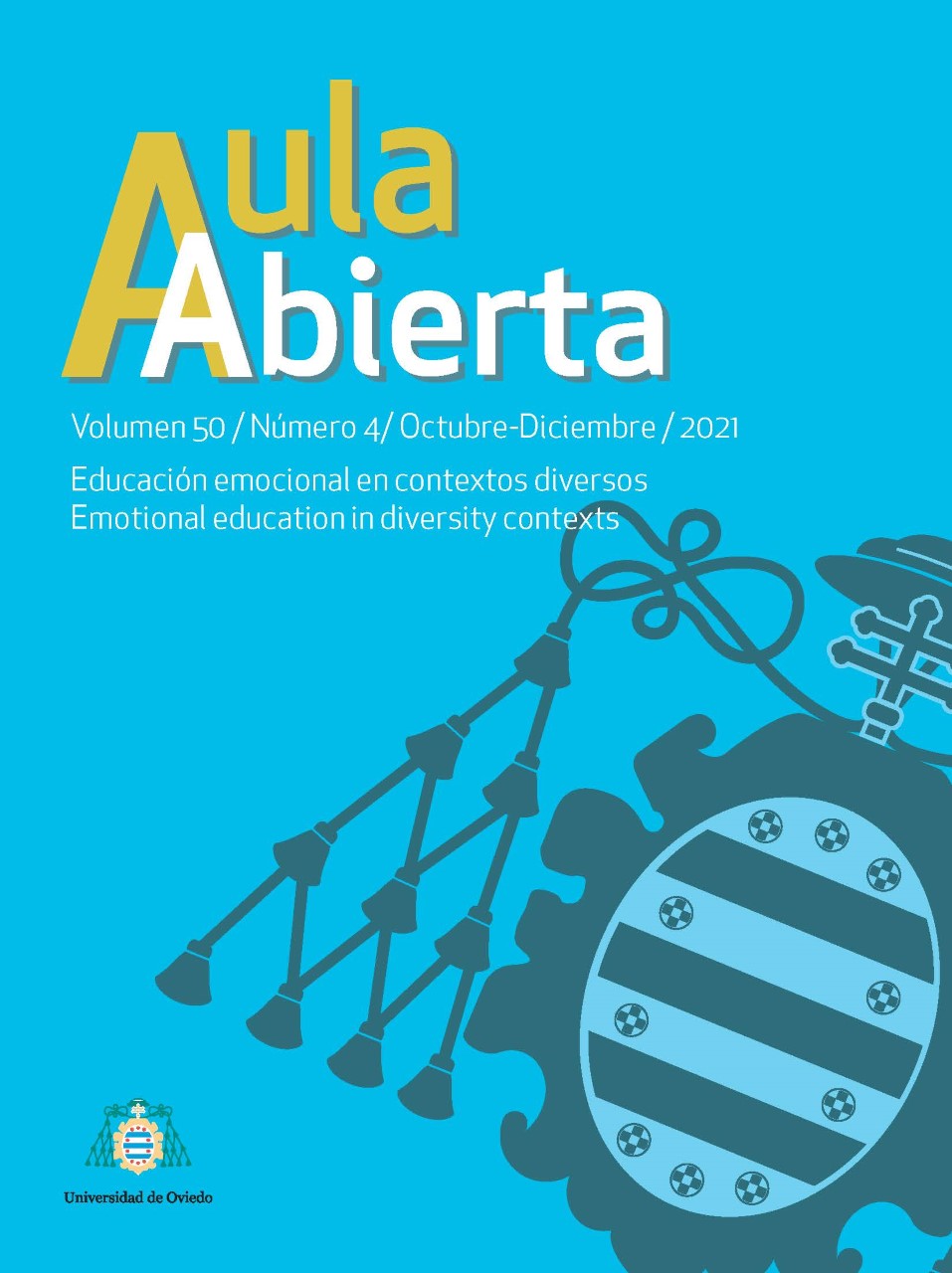Resumen
Se presenta un estudio de caso de un centro de ESO caracterizado por su elevada multiculturalidad. Para explorar las dificultades y los apoyos emocionales del alumnado migrante se realizaron entrevistas a la comunidad educativa (16 informantes clave: ocho del profesorado, dos de la comunidad educativa, cuatro del alumnado y dos de las familias) y se analizaron documentos clave (PEC: Proyecto Educativo de Centro y PGA: Programación General Anual). Las principales dificultades percibidas fueron la experiencia migratoria, los conflictos ante el rol de género de la mujer occidental y la pertenencia a grupos segregados; seguidos por el desconocimiento del idioma, la falta de implicación en la relación escuela-familia y la desatención de las familias hacia sus hijas e hijos y, en menor medida, la discriminación social. Así mismo, se encontraron como apoyos la educación intercultural y emocional del centro, la acogida escolar al alumnado migrante y, en menor medida, la supervisión y apoyo escolar de la familia, así como la promoción de la relación escuela-familia. Se destaca la relevancia de la cultura escolar de cuidados al alumnado y sus familias, señalando las necesidades de formación del profesorado en competencias interculturales y emocionales y de relación con las familias migrantes.
Citas
Arroyo-González, Mª-José, & Berzosa-Ramos, Ignacio (2018). Atención educativa al alumnado inmigrante: En busca del consenso. Revista de Educación, 379, 192-203.
Bisquerra-Alzina, Rafael, & García-Navarro, Esther (2018). La educación emocional requiere formación del profesorado. Participación educativa, 5(8), 13-28.
Dabach, Dafney-Blanca, Suárez-Orozco, Carola, Hernández, Sera-J., & Brooks, Maneka-Deannad (2018). Future Perfect?: Teachers’ Expectations and Explanations of their Latino Immigrant Students’ Postsecondary Futures. Journal of Latinos and Education, 17(1), 38–52.
Domínguez-Alonso, José, López-Castedo, Antonio, & Álvarez-Roales, Enrique (2015). Implicación de variables sociales y educativas en la conducta asertiva adolescente. Aula abierta, 43(1), 26-31.
Fernández-Larragueta, Susana, Fernández-Sierra, Juan & Rodorigo, Monia (2017). Expectativas socioeducativas de alumnas inmigrantes: Escuchando sus voces. Revista de Investigación Educativa, 35(2), 483-498.
Flick, Uwe (2009). An introduction to qualitative research. New York: Sage.
Gomariz-Vicente, Mª-Ángeles, Martínez-Segura, Mª-José & Parra-Martínez, Joaquín (2019). Desde la implicación en el hogar de las familias a la facilitación de los docentes en un contexto multicultural. Revista Electrónica Interuniversitaria de Formación del Profesorado, 22.
Hernández-Prados, Mª-Ángeles, Gomariz-Vicente, Mª-Ángeles, Parra-Martínez, Joaquín & García-Sanz, Mª-Paz (2016). Familia, inmigración & comunicación con el centro escolar: Un estudio comparativo. Educación XX1, 19(2), 127-151.
Hernández-Prados, Mª-Ángeles, García-Sanz, Mª-Paz, Parra-Martínez, Joaquín, & Gomariz-Vicente, Mª-Ángeles (2019). Participación familiar en los centros de educación secundaria. Anales de Psicología, 35(1), 84–94.
INJUVE (2020). Informe Juventud en España 2020. Dirección General del INJUVE y Observatorio de la Juventud en España.
ISTAC (2021). Población según sexos y países de nacimiento. Municipios por islas de Canarias y años. ISTAC: Estadísticas de la Comunidad Autónoma de Canarias
Jaƒfe-Walter, Reva (2018). Leading in the Context of Immigration: Cultivating Collective Responsibility for Recently Arrived Immigrant Students. Theory Into Practice, 57(2), 147-153.
López-Zafra, Esther, & El-Ghoudani, Karima (2014). The influence of culture of honor and emotional intelligence in the acculturation of Moroccan immigrant women. The Spanish Journal of Psychology, 17, 1-9.
Lorenzo-Moledo, Mar, Godás-Otero, Agustín, & Santos-Rego, Miguel-A. (2017). Main determinants of immigrant families’ involvement and participation in school life. Cultura y Educación, 29(2), 213-253.
Martin, Margary & Suárez-Orozco, Carola (2018). What It Takes: Promising Practices for Immigrant Origin Adolescent Newcomers. Theory Into Practice, 57(2), 82-90.
Mayoral-Peñas, Milagros, Jiménez-Blasco, Beatriz-Cristina, Sassano-Luiz, Silvana, & Resino-García, Rosa (2020). Inmigración y educación: experiencias de discriminación en la Comunidad de Madrid. Espacio Tiempo y Forma. Serie VI, Geografía, 13, 191–214.
Mera-Lemp, Mª-José, Martínez-Taboada, Cristina, & Elgorriaga-Astondoa, Edurne (2014). Rendimiento académico, ajuste escolar e inteligencia emocional en adolescentes inmigrantes y autóctonos. Boletín de psicología, 110, 69-82. https://www.uv.es/seoane/boletin/previos/N110.htm
Murillo-Torrecilla, F-Javier, Martínez-Garrido, Cynthia, & Belavi, Guillermina (2017). Segregación escolar por origen nacional en España. OBETS. Revista de Ciencias Sociales, 12(2), 395-423.
Patel, Sita, Clarke, Anette, Eltareb, Fazia, Macciomei, Erynn, & Wickham, Robert (2016). Newcomer Immigrant Adolescents: A Mixed-Methods Examination of Family Stressors and School Outcomes. School Psychology Quarterly, 31(2), 163-180.
Passiatore, Ylenia, Pirchio, Sabine, Carrus, Giuseppe, Maricchiolo, Fridanna, Fiorilli, Caterina, & Arcidiacono, Francesco (2019). Intercultural practices and inclusive education in Europe: Can migration be a resource for individual and societal development? European Journal of Psychology of Education, 34(1), 209-224.
Pegalajar-Palomino, Mª-Carmen, & Colmenero-Ruiz, Mª-Jesús (2014). Inteligencia emocional en alumnado de Educación Secundaria en contextos multiculturales. Electronic Journal of Research in Educational Psychology, 12(2), 325-342.
Pérez-Escoda, Nuria, Filella-Guiu, Gemma, Alegre-Roselló, Albert, & Bisquerra-Alzina, Rafael (2018). Desarrollo de la competencia emocional de maestros y alumnos en contextos escolares. Electronic Journal of Research in Education Psychology, 10(28), 1183-1208.
Sánchez-Castelló, Mª, Navas-Luques, Marisol, Ordóñez-Carrasco, Jorge, & Rojas-Tejada, Antonio-J. (2020). Acculturation and adaptation of adolescents with immigrant backgrounds in Spain: Psychosocial profiles of latent classes. Revista De Psicología Social, 35(3), 560-588.
Smith, Naila, Brown, Joshua, Tran, Tran, & Suárez-Orozco, Carola (2020). Parents, friends and inmigrant youths’ academic engagement: A mediation analysis. International Journal of Psychology, 55(5), 743-753.
Suárez-Orozco, Carola, Casanova, Saskias, Martin, Margary, Katsiafica, Dalal, Cuellar, Veronica, Smith, Naila-Antonia, & Dias, Sandra-Isabel (2015). Toxic Rain in Class: Classroom Interpersonal Microaggressions. Educational Researcher, 44(3), 151-160.
Torrijos-Fincias, Patricia, Martín-Izard, Juan-Francisco, & Rodríguez-Conde, Mª-José (2018). La educación emocional en la formación permanente del profesorado no universitario. Profesorado, Revista de Currículum y Formación del Profesorado, 22(1), 579-597.
Viñuela-Hernández, Mª-Paulina, Rodríguez-Menéndez, Carmen, Torío-López, Susana, & Fernández-García, Carmen (2019). Práctica discursiva familiar y cultura contraescolar en minorías étnicas. Aula Abierta, 48(3), 279-290.

Esta obra está bajo una licencia internacional Creative Commons Atribución-NoComercial-SinDerivadas 4.0.
Derechos de autor 2021 Aula Abierta





